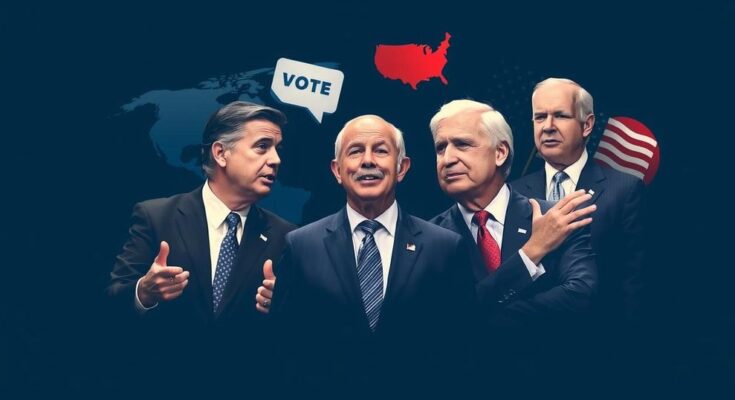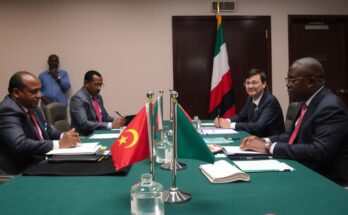Donald Trump’s reelection as President has prompted global leaders to express both congratulations and concerns. His past leadership strained relations with many allies, with apprehension surrounding future commitments to NATO, ongoing conflicts in Ukraine and the Middle East, as well as economic relations with China and Europe. Leaders are cautiously optimistic about strengthening alliances but wary of Trump’s unpredictable foreign policy.
Following Donald Trump’s decisive reelection as President of the United States, the global landscape is rife with apprehension regarding the implications of his leadership. Trump secured the necessary 270 electoral college votes and delivered a victory speech committing to prioritize American interests and envisioning a “golden age” for the nation. His previous tenure saw strained relations with longtime allies, raising concerns about future international cooperation on critical issues such as trade, climate change, and security relations. Leaders from NATO, Europe, and beyond have quickly responded to Trump’s return. NATO Secretary-General Mark Rutte expressed eagerness to work together to bolster global security. Meanwhile, Ukrainian President Volodymyr Zelenskyy welcomed Trump’s declared aim of promoting peace through strength amidst the ongoing Russian invasion of Ukraine. Conversely, reactions from Moscow reveal a tense state of affairs, emphasizing a significant diplomatic challenge in U.S.-Russia relations. European leaders expressed a mix of congratulations and caution in their responses. British Prime Minister Keir Starmer heralded Trump’s win as a historic moment for U.S.-UK relations, while French President Emmanuel Macron balanced respect with a need for ambition in their future dealings. However, concerns linger about Trump’s protectionist policies, particularly his previous imposition of tariffs on European goods, which unsettled economic relations. The Middle East, witnessing tumultuous relations, is likewise poised for scrutiny as Trump’s previous efforts to forge alliances—such as the normalization between Israel and Saudi Arabia—may now resurface. Israeli Prime Minister Benjamin Netanyahu lauded Trump’s return, framing it as a renewed commitment to strong U.S.-Israel relations, although the internal political landscape in Israel remains complex. Analysts remain watchful of Trump’s foreign policy concerning China and Taiwan, as uncertainties surround potential new tariffs and diplomatic strategies, particularly within the context of the ongoing rivalry for influence in Asia. Allies in the Indo-Pacific region, such as Japan and South Korea, have expressed optimism about strengthening alliances but also show signs of apprehension regarding the reliability of U.S. defense commitments under Trump’s leadership. In summary, the international community is monitoring Trump’s presidency closely, with global leaders forecasting both potential opportunities and significant challenges ahead in various geopolitical domains. The overarching sentiment is one of caution as allies prepare for a future that may not guarantee the stability previously assumed in U.S. foreign policy.
In the wake of Donald Trump’s unexpected reelection, global leaders and political analysts grapple with the potential repercussions his presidency may have on international relations and global stability. Trump’s leadership style in his first term was characterized by a confrontational approach towards allies, leading to uncertainty about the future direction of U.S. foreign policy. His victory introduces renewed discussions regarding diplomatic alliances, military commitments, and economic policies, particularly with respect to trade and military support for regions like Europe and the Indo-Pacific.
Donald Trump’s recent election victory has elicited a range of responses from global leaders, illustrating their concerns about international relations and security dynamics. While some praise Trump’s assertive stance, sentiments of anxiety prevail, particularly regarding commitments to NATO and the evolving geopolitical situations in Ukraine and the Middle East. The forthcoming administration’s actions will significantly impact global trade, strategic alliances, and conflict resolutions, shaping the diplomatic landscape for years to come.
Original Source: www.pbs.org




